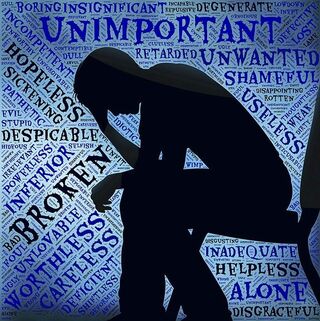Depression
Where Depression Lives
How to recognize the spaces in your head where the condition takes up residence.
Posted July 14, 2021 Reviewed by Gary Drevitch
Key points
- Depression affects what we do, how we feel, and what we think.
- Depression lurks in our minds, in the space between ourselves and others, and in the spaces within ourselves.
- Changing how we think and what we do can fill the spaces where depression could otherwise take root.

People describe depression in different ways. There is usually a sense that depression is a presence that overtakes them, as unwelcome as it may be. They may describe it as a dark cloud that hangs over them or refer to it as an uninvited guest. Novelist William Styron famously characterized his descent into depression as entering a "darkness visible." One woman who struggled with depression through much of her life referred to those dark periods as times when “the Beast” was back.
Depression lives in spaces within ourselves and between ourselves and others. In working with depressed patients, I've noticed three types of spaces in which depression takes up residence: the spaces between our ears, the spaces between ourselves and others, and the spaces within ourselves.
Depression affects how we feel, what we do, and what we think. It sucks the pleasure out of everything we once enjoyed, sapping our motivation to such an extent that even getting out of bed in the morning becomes a titanic struggle. It leaves us feeling hopeless in just about everything we try to do. Layered over deep feelings of sadness are negative thoughts about our self, the world, and the future. In all, it may feel like a heaviness that bears down on you, making it hard to imagine there could ever be a brighter future.
Depression finds spaces in your head to plant its roots. But denying it the space it needs can help you move toward recovery. Depression is a serious psychological disorder that should be evaluated by a mental health professional, one equipped to evaluate your symptoms and propose an appropriate treatment plan. Yet there is much you can do for yourself to deny depression the spaces in your head where it takes root.
The Spaces Between Our Ears
Cognitive therapists recognize that how we think affects how we feel, and that to change how we feel, we need to change how we think. This blog is dedicated to ways of rethinking our thoughts, to examining what’s going on in our mind so that we can substitute healthier ways of thinking in place of faulty, distorted ways that bring us down and keep us from engaging with life.
The Spaces Between Ourselves and Others
Depression often fills the gaps between ourselves and others. When we're depressed, we tend to withdraw from social interactions, making excuses for not getting together or declining invitations to social events because we just don’t "feel up to it." But the more we isolate ourselves within ourselves, the less opportunity we have for social reinforcement and the simple rewards of just hanging out or sharing good times and casual conversation. As the flow of social reinforcers ebbs, our moods slope downward and a vicious cycle ensues in which depression pulls us away from others and then isolation feeds depression, leading to yet more isolation, longer and more persistent depression. Patients struggling with depression need to hear that it’s okay to connect with others even if they are not feeling their best, that they don’t have to be the life of the party to connect with other people. Even if they feel they have little to offer by way of conversation, they should understand that what people tend to like more than anything else is to talk about themselves. So just asking them questions about movies or shows they’ve liked, their plans for vacation, or what’s new with the families is enough to get the social connection flowing.
The Spaces Within Ourselves
Life without meaning is, well, meaningless. Modern philosophy (existentialism) and psychology (humanism) coalesce around the importance of finding meaning and purpose in life. We can seek meaning by finding work that provides a sense of purpose and accomplishment, by forming or strengthening connections with family, friends, and community, and by pursuing goals that are larger than ourselves, such as social, charitable, or political activities. One of the first questions I pose to depressed patients is to consider what gives their life meaning and fills the gaps within themselves. Depression resides in spaces left hollow within the self.
Furnishing the Mind
This perspective on depression can be likened to furnishing an empty house. We can look at our own empty spaces and start filling them up, but without the need to have boxes shipped from the likes of Ikea or Wayfair. We shouldn’t expect psychiatric drugs to fill these spaces in our heads. The uplift we seek comes from the work we do ourselves to fill the spaces in our head with heathier ways of thinking, by forging new social connections or renewing older ones, and by seeking ways to imbue our lives with meaning and a sense of purpose. I think of my therapeutic role with depressed patients as that of a guide rather than a healer, helping direct them to what they can do to fill the empty spaces. How might you begin filling the spaces in your head where depression may be lurking?
General Disclaimer: The content here and in other blog posts on the Minute Therapist is intended for informational purposes only and not for diagnosis, evaluation, or treatment of mental health disorders. If you are concerned about your emotional well-being or experiencing any significant mental health problems, I encourage you to consult a licensed mental health professional in your area for a thorough evaluation.
(c) 2021 Jeffrey S. Nevid


